Saturday, June 04, 2011
Ninth Blog-O-Versary
Nine years and some 11,000 posts later, I'm still here.
Testimony to either my Guinea-Mick mulishness or just plain disciplined doggedness.
Here are the Cheiftains, the Corrs, and others celebrating:
From Rogues' Gallery, I'll Fathom the Bowl
The Clancy Brothers and Tommy Makem get down with Portlairge
Session in an Irish pub
To Anacreon In Heaven
The City of Boston celebrates on July 4th (a month late)
The Liberty Boys with one of my favorites, Nottingham Ale
The LSO gets into the act with a little Handel
Finally, HMS Victory fires a rolling broadside for the occasion
This, folks, is why there was no Mid-Week Mix on Wednesday.
Miles to go before I sleep. God bless.
Testimony to either my Guinea-Mick mulishness or just plain disciplined doggedness.
Here are the Cheiftains, the Corrs, and others celebrating:
From Rogues' Gallery, I'll Fathom the Bowl
The Clancy Brothers and Tommy Makem get down with Portlairge
Session in an Irish pub
To Anacreon In Heaven
The City of Boston celebrates on July 4th (a month late)
The Liberty Boys with one of my favorites, Nottingham Ale
The LSO gets into the act with a little Handel
Finally, HMS Victory fires a rolling broadside for the occasion
This, folks, is why there was no Mid-Week Mix on Wednesday.
Miles to go before I sleep. God bless.
Labels: Recta Ratio Housekeeping
Our Blessed Lady's Saturday

Remember, Our Lady of the Sacred Heart, what ineffable power thy divine Son hath given thee over His own adorable Heart. Full of trust in thy merits, we come before thee and beg thy protection. O heavenly Treasurer of the Heart of Jesus, that Heart which is the inexhaustible source of all graces, which thou mayest open to us at thy good pleasure, in order that from it may flow forth upon mankind the riches of love and mercy, light and salvation, that are contained therein; grant unto us, we beseech thee, the favors which we seek. . . . We can never, never be refused by thee, and since thou art our Mother, O our Lady of the Sacred Heart, graciously hear our prayers and grant our request.
Amen.
Labels: Our Blessed Lady
Friday, June 03, 2011
Friday At the Foot Of the Cross

By the sign of the cross deliver us from our enemies, O our God.
In the name of the Father, and of the Son, and of the Holy Ghost.
Amen.
Labels: Friday At the Foot Of the Cross
Thursday, June 02, 2011
Ascension Thursday

Happily, the Archdiocese of Boston adheres to the old rule, that the Ascension falls 40 days after Easter, on a Thursday. And even if it didn't, since I follow the 1962 Ordo (with some exceptions and additions) today would still be Ascension Thursday, a holy day of obligation.
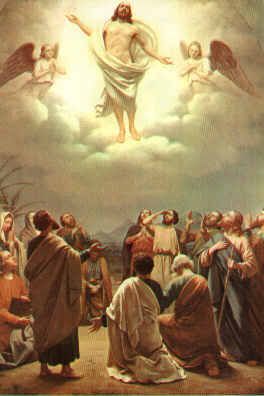
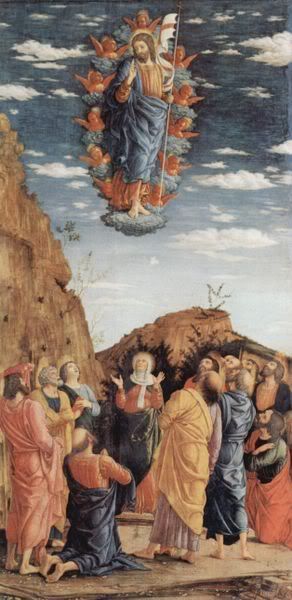
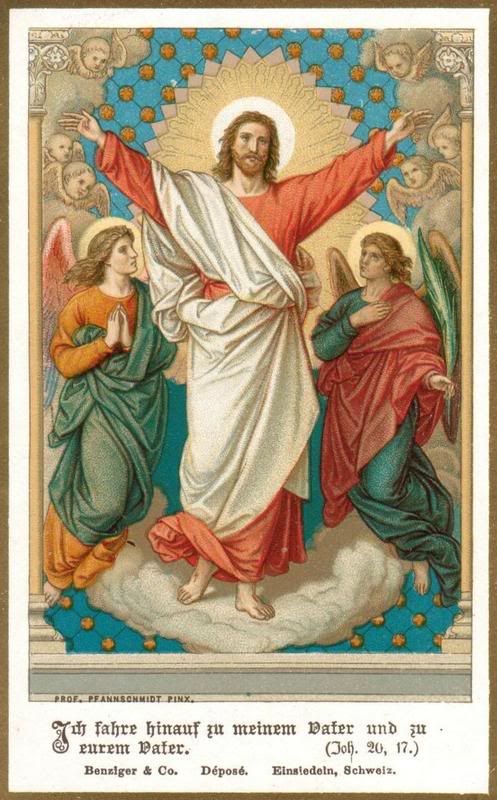
Labels: Ascension Thursday
Wednesday, June 01, 2011
June, 2011

The Arnold Arboretum In June
June is devoted the The Sacred Heart of Our Lord Jesus Christ
Important feasts celebrated during the month of June include:
2nd St Erasmus (Elmo)
3rd St. Clotilde
5th St. Boniface
6th St. Norbert
8th St. Medard
9th St. Columkill
12th St. Gaspar Bertoni
13th St. Anthony of Padua
15th St. Vitus
17th St. Botolph
19th St. Odo of Cambrai and Bl. Sebastian Newdigate, Humphrey Middlemore, Thomas
Woodhouse, and William Exmew (martyrs)
20th Bl. Anthony Turner, John Fenwick, John Gavan, Thomas Whitbread, and William Harcourt (martyrs
21st Bl. John Rigby (martyr)
22nd SS Thomas More and John Fisher
23rd Midsummer Night's Eve
24th St. John the Baptist (Nativity) Midsummer Day
26th St. Josemaria Escriva de Balaguer
27th Our Lady of Perpetual Help
29th SS. Peter and Paul
June this year begins in Rogationtide, and moves on the Second into the time between Ascension Thursday and Pentecost. Then it ends in the time after Pentecost. Whitsunday is Sunday June 12th. Trinity Sunday is Sunday June 19th. Thursday June 23rd is Corpus Christi. The Feast of the Sacred Heart is July 1st. The Feast of the Immaculate Heart in the 1970 Ordo is Saturday July 2nd.
The Whitsun Embertide is Wednesday June 15th, Friday June 17th, and Saturday June 18th.
The published prayer intentions of our Holy Father Pope Benedict XVI for June, 2011 are:
General:
That priests, united to the Heart of Christ, may always be true witnesses of the caring and merciful love of God.
Missionary:
That the Holy Spirit may bring forth from our communities numerous missionary vocations, willing to fully consecrate themselves to spreading the Kingdom of God.
Labels: First Of the Month Almanac
Rogation Wednesday
One of the glories of Catholicism is its ability to incorporate so many varying interests in aspects of our Catholic Faith under the same general rubric. Some Catholics are devoted to the Rosary, others to the Sacred Heart. Some especially revere Our Lady of Mount Carmel, others Our Sorrowful Mother. Some love the devotion of the Five Sacred Wounds, while others cling just as doggedly to the devotion of the Fifteen Os of Saint Bridget. Some are clients of this saint, some of that.
The Church's manner of accommodating so many varying interests has been to foster guilds devoted to these aspects of Catholic piety. The creation of a group of people devoted to a particular aspect of the Faith allows like-minded folks to interact, but at the same time keeps them within the bounds of our Mother the Church. The Church, in the modern parlance, is a "Big Tent." So long as you adhere to the Magesterium in matters of faith and morals, and live within the Church and its teachings, no one is going to make a fuss if you prefer to pray to St. Michael as the escort of souls, or to St. Joseph as the patron of a happy death, or to the general patronage of Our Blessed Lady, when you pray for a happy and holy death.
Guilds for a particular devotion have a long history, and were present in England before the protestant rebellion. They thrived in the 19th century, and were still going strong before the post-Vatican II tidal wave nearly wrecked everything. I believe, though I don't have any evidence to support this at the moment, that they are making a quiet comeback today. Where the Church is healthy, you will still find active St. Vincent de Paul Societies, and busy Holy Name Societies. The Spanish Penitents i profiled during Holy Week are modern devotional guilds.
As I said, the devotional guilds were a part of Catholic life well before the 1500s. And of course, as the parish community processed on important feast days, like the Rogation Days, the guilds took part. The processed together as a group (and one can imagine that the parish priest had to diplomatically allot the guilds' respective places in the procession).
Each group had some sort of banner. Often these banners were ephemeral, like the felt things one sees in churches today. But sometimes they were crafted symbols of the guild.
I have only found one image of surviving guild banners for procession. They are from France, and probably do not predate the French Revolution.
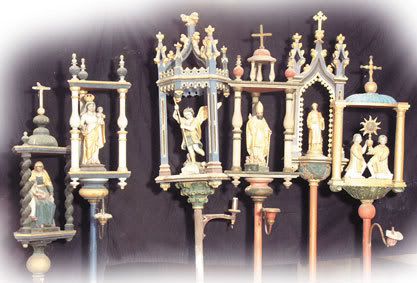
But one can see a Catholic community dividing itself into its "little platoons" and processing behind the Crucifix and the parish priest in small groups as they perambulate the parish, asking blessing on the crops, praying the Litany of the Saints, and beating the bounds of the parish.
The Church's manner of accommodating so many varying interests has been to foster guilds devoted to these aspects of Catholic piety. The creation of a group of people devoted to a particular aspect of the Faith allows like-minded folks to interact, but at the same time keeps them within the bounds of our Mother the Church. The Church, in the modern parlance, is a "Big Tent." So long as you adhere to the Magesterium in matters of faith and morals, and live within the Church and its teachings, no one is going to make a fuss if you prefer to pray to St. Michael as the escort of souls, or to St. Joseph as the patron of a happy death, or to the general patronage of Our Blessed Lady, when you pray for a happy and holy death.
Guilds for a particular devotion have a long history, and were present in England before the protestant rebellion. They thrived in the 19th century, and were still going strong before the post-Vatican II tidal wave nearly wrecked everything. I believe, though I don't have any evidence to support this at the moment, that they are making a quiet comeback today. Where the Church is healthy, you will still find active St. Vincent de Paul Societies, and busy Holy Name Societies. The Spanish Penitents i profiled during Holy Week are modern devotional guilds.
As I said, the devotional guilds were a part of Catholic life well before the 1500s. And of course, as the parish community processed on important feast days, like the Rogation Days, the guilds took part. The processed together as a group (and one can imagine that the parish priest had to diplomatically allot the guilds' respective places in the procession).
Each group had some sort of banner. Often these banners were ephemeral, like the felt things one sees in churches today. But sometimes they were crafted symbols of the guild.
I have only found one image of surviving guild banners for procession. They are from France, and probably do not predate the French Revolution.

But one can see a Catholic community dividing itself into its "little platoons" and processing behind the Crucifix and the parish priest in small groups as they perambulate the parish, asking blessing on the crops, praying the Litany of the Saints, and beating the bounds of the parish.
Labels: Rogation Days
Tuesday, May 31, 2011
The Queenship Of Our Blessed Lady
Rogation Tuesday
Since Rogationtide processions went on during all three days before Ascension Thursday, and there is a practical limit to how many times the congregation can chant the Litanies, and participate in the various prayers offered for newly-planted crops, something else needed to be added to occupy those in the procession. And that is the beating of the bounds.
As time went by, with parish and property lines often marked by natural features like a protuberant stone, those boundary lines often became blurred and shifted, either through natural events (a stream drying up or shifting) or human action (moving a stone to move the property line). A parish might want to exclude a home from its territory if the inhabitants were poor and shiftless and likely to become a charge on the charity of the parish. Or it might want to include more affluent homes on the edge of the boundary.
So, over time, means were devised to create a living memory of just where the boundary line was, regardless of the natural features mentioned in any grants or deeds. What was devised was this. During one or more of the Rogation Processions, the young boys of the parish were brought along and enjoined to memorize the exact line of the boundary. The boys would be beaten with narrow sticks to ensure their proper memorization, and to chastise them if their memory was faulty. Thus, the "Beating of the Bounds."
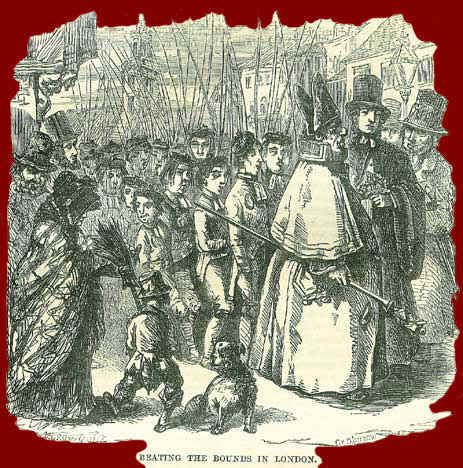
Today, when a "Beating of the Bounds" occurs, it tends to be in England, and to be a High Church Anglican thing. They have the old territorial parishes and the parish churches, since the protestant rebellion. English Catholics today, having less official status and being more scattered, take little interest in such local displays. Also today, it appears that New Age pagans like to attach themselves to Beating of the Bounds processions during Rogationtide, since it is a seasonal fancy-dress occasion. And they are joined by morris dancers, town criers, handbell guilds, and so on.
But the origins of the procession and the beating of the bounds are firmly Catholic. Perhaps someday, the vehicle of the Rogation Procession will be reunited to the Catholic practice that gave rise to it.
As time went by, with parish and property lines often marked by natural features like a protuberant stone, those boundary lines often became blurred and shifted, either through natural events (a stream drying up or shifting) or human action (moving a stone to move the property line). A parish might want to exclude a home from its territory if the inhabitants were poor and shiftless and likely to become a charge on the charity of the parish. Or it might want to include more affluent homes on the edge of the boundary.
So, over time, means were devised to create a living memory of just where the boundary line was, regardless of the natural features mentioned in any grants or deeds. What was devised was this. During one or more of the Rogation Processions, the young boys of the parish were brought along and enjoined to memorize the exact line of the boundary. The boys would be beaten with narrow sticks to ensure their proper memorization, and to chastise them if their memory was faulty. Thus, the "Beating of the Bounds."

Today, when a "Beating of the Bounds" occurs, it tends to be in England, and to be a High Church Anglican thing. They have the old territorial parishes and the parish churches, since the protestant rebellion. English Catholics today, having less official status and being more scattered, take little interest in such local displays. Also today, it appears that New Age pagans like to attach themselves to Beating of the Bounds processions during Rogationtide, since it is a seasonal fancy-dress occasion. And they are joined by morris dancers, town criers, handbell guilds, and so on.
But the origins of the procession and the beating of the bounds are firmly Catholic. Perhaps someday, the vehicle of the Rogation Procession will be reunited to the Catholic practice that gave rise to it.
Labels: Rogation Days
Daily Marian Prayer and Image

From The Glories Of Mary, by Saint Alphonsus de Liguori:
Most Holy Mary, Mother all-good and all-loving, when I remember my sins and think of the moment of death, I tremble and scarcely know where to turn. But my hope is in the Blood of Jesus Christ and thy powerful intercession, O my loving Mother.
Comforter of the afflicted, be with me in that hour, console me in that great affliction. If even now the remorse over my sins, the uncertainty of pardon, the danger of relapse, and the rigor of Divine Justice so frighten me, how will it be with me then?
Ah my Lady, obtain for me before death comes a deep sorrow for my sins, true amendment, and fidelity to God for the remainder of my days.
And when at last the hour of death arrives, O Mary my hope, help me in that terrible anguish in which I will find myself. Strengthen me against despair over the remembrance of my sins, which the devil will call up before me.
Obtain for me the grace to call upon thee over and over in that dread hour, so that I may die with thy name and the name of thy most holy Son on my lips.Thou hast granted this grace to so many of thy clients. I too desire it and hope for it.
Amen.
Labels: Our Blessed Lady
Monday, May 30, 2011
Rogation Monday
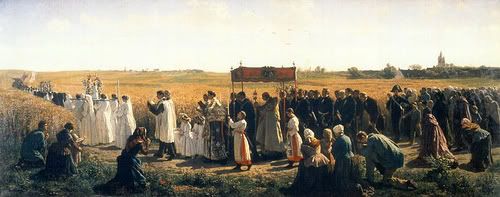
Today, tomorrow, and Wednesday are the Rogation or "Gang" Days.
From a University of Chicago site:
The Rogation Days are three (or four) days focused on agriculture and nature, where we pray for a good harvest, fruitful crops, good weather, and protection from flood, tornado, earthquake, and other natural disasters. Traditionally the Church offers these requests on the Monday, Tuesday, and Wednesday before the Feast of the Ascension, although some churches also add the Sunday before Ascension, before Rogation Monday. (The Catholic Church marks April 25 as the Major Rogation, and the days before Ascension as the Minor Rogation.)
Rogation comes from the Latin rogatio and French rogare, meaning "to ask." Fifth-century France was beset with a number of natural disasters, including floods, failing harvests, and an earthquake on Ascension (which always falls on a Thursday). In response to these calamities Mamertus, Bishop of Vienne, called for three days of prayer, fasting, and repentance, and this quickly became the custom for the three days preceding Ascension.
The observance of Rogation Days spread throughout Europe (In England, the days are also known as Gang-Days, Gang-Week, or Cross-Week.) Many churches led a procession around the town or parish boundaries on one of the Rogation Days, chanting a litany to the saints and offering prayers for a good year. This practice became known as "beating the bounds." George Herbert recommends this practice in A Country Parson (see chapter 25).
Many churches in farming communities continue to observe a traditional Rogation.Other churches are adapting the Rogation services to a technology-based society.
more about Rogation Days here, here, here, and here.
Labels: Rogation Days
Daily Marian Prayer and Image

From The Glories Of Mary, by Saint Alphonsus de Liguori:
O MARY, of all creatures thou art the noblest, the purest, the holiest, the most sublime, the most beautiful. Oh, that all knew you, my Lady, and loved thee as thou deserveth!
I too, though I am a sinner, love thee, my most amiable Queen. And yet I love thee too little. I long to love thee with a greater and more tender affection, and it is thou who must obtain this grace for me. To love thee is a singular mark of predestination, a grace that God grants to those who are saved.
Then too, my Mother, I realize my great obligation to love thy Son; I see that He deserves an infinite love. Since thou desireth so much to see Him loved, obtain this grace for me --- a deep love for Jesus Christ.
I have no wish for earthly goods, for honors, for riches. I ask for that which thine heart desires far more, to love my God alone. Is it likely that thou wilt not help me in my desire, which is so pleasing to thee? Ah no, for even now thou art praying for me.
But I am consoled in thinking that so many Souls in Heaven and saintly people on earth love thee for thy goodness and beauty. Above all, I rejoice that God Himself loves thee alone, more than He loves all men and Angels together.
Pray for me, Mary; pray and never cease to pray until thou dost greet me in Heaven. There I shall possess my God forever . There too I shall possess my dearest Mother.
Amen.
Labels: Our Blessed Lady
Sunday, May 29, 2011
The Fifth Sunday After Easter, Or the Sunday Before Rogationtide
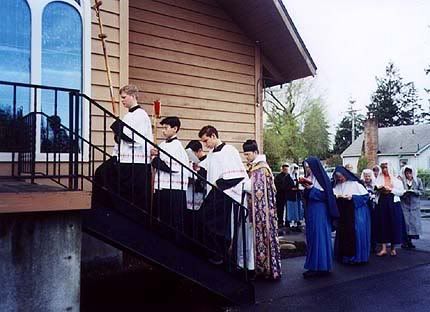
From The Liturgical Year, by Abbot Prosper Gueranger, OSB:
In the Greek Church, the fifth Sunday after Easter is called the Sunday of the man born blind, because her Gospel for the day contains the history of that miracle of our divine Lord. She also calls it Episozomene, which is one of the names given by the Greeks to the mystery of the Ascension, the feast of which is kept with them, as with us, during the course of this week.
The holy apostle, whose instructions these are, had received them from our risen Jesus: hence the authoritative tone wherewith he speaks. Our Saviour, as we have already seen, honoured him with a special visit. This proves that he was particularly dear to his divine master, to whom he was related by the tie of consanguinity on his mother's side, whose name was Mary. This holy woman went on Easter morning to the sepulchre, in company with her sister Salome, and Magdalene. St. James the Less is indeed the apostle of Paschal Time, wherein everything speaks to us of the new life we should lead with our risen Lord. He is the apostle of good works, for it is from him that we have received this fundamental maxim of Christianity, that though faith be the first essential of a Christian, yet without works it is a dead faith, and will not save us.
He also lays great stress on our being attentive to the truths we have been taught, and on our guarding against that culpable forgetfulness, which plays such havoc with thoughtless souls. Many of those who have this year received the grace of the Easter mystery, will not persevere; and, the reason is, that they will allow the world to take up all their time and thoughts, whereas they should use the world as though they did not use it. [I Cor. vii. 31.] Let us never forget, that we must now walk in newness of life, in imitation of our risen Jesus, who dieth now no more.
The two Alleluia-versicles celebrate the glory of the Resurrection; but they also contain an allusion to the approaching Ascension. Jesus was born eternally from the Father; He came down to us; but now, in a few days, He is to return to his Father.
When, at His last Supper, our Saviour thus warned His apostles of His having soon to leave them, they were far from knowing Him thoroughly. True, they know that He came forth from God; but their faith was weak, and they soon lost it. Now that they are enjoying His company after His Resurrection, now that they have received such light from His instructions, they know Him better. He no longer speaks to them in proverbs; He teaches them everything they require to know in order to become the teachers of the whole world. It is now they might truly say to Him: We believe that thou camest forth from God! So much the more, then, do they understand what they are going to lose by His leaving them.
Our Lord begins now to reap the fruit of the word He has sown in their hearts: oh! how patiently has He waited for it! If He praised them for their faith, when they were with Him on the night of the last Supper, He may surely do so now that they have seen Him in the splendour of His Resurrection, and have been receiving such teaching from His lips. He said to them, at the last Supper: The Father loveth you, because ye have loved Me; how much more must the Father love them now, when their love for Jesus is so much increased! Let us be consoled by these words. Before Easter our love of Jesus was weak, and we were tepid in His service; but now that we have been enlightened and nourished by His mysteries, we may well hope that the Father loves us, for we love Jesus better than we did before. This dear Redeemer urges us to ask the Father, in His name, for everything we need. Our first want is perseverance in the spirit of Eastertide; let it be our most earnest prayer; let it be our intention now that we are assisting at the holy sacrifice, which is soon to bring Jesus upon our altar.
The Offertory is taken from the Psalms; it is an act of thanksgiving which the Christian, united with his risen Jesus, offers to God for having brought him to the new life, and made him the object of His choicest graces.
Labels: The Liturgical Year
Daily Marian Prayer and Image

From The Glories Of Mary, by Saint Alphonsus de Liguori:
QUEEN of Heaven, most Holy Mary, I was once a slave of sin, but now I consecrate myself to thee as thy client forever. I give myself to thine honor and service for the rest of my life. Do not reject me as I deserve, but accept me as thy servant.
I have placed all my hope in thee as my Mother. I bless and thank Almighty God, because in His mercy He has given me this confidence in thee. It is true that in the past I have shamefully fallen into sin; but I trust that, through thy prayers and the merits of Jesus Christ, I have been forgiven. But yet, my Mother, this is not enough. One fear I have which troubles me: that I may fall into sin again and lose the grace of God.
The dangers are constant; my enemies never sleep; and new temptations will assail me. O my Lady, protect me. Help me in the assaults of Hell, so I may never again offend thy Divine Son Jesus.
Let not the same thing happen again, that I lose my soul, Heaven, and God. This is the grace I beg of thee, O Mary; this is what I long for; obtain this grace for me through thy prayers.
Amen.
Thus, I hope. Thus, may it be.
Labels: Our Blessed Lady













































































































